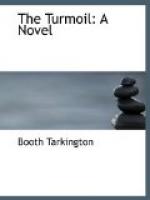“I’ll tell you what it meant to me,” she said, as he did not immediately reply. “Almost any music of Handel’s always means one thing above all others to me: courage! That’s it. It makes cowardice of whining seem so infinitesimal—it makes most things in our hustling little lives seem infinitesimal.”
“Yes,” he said. “It seems odd, doesn’t it, that people down-town are hurrying to trains and hanging to straps in trolley-cars, weltering every way to get home and feed and sleep so they can get down-town to-morrow. And yet there isn’t anything down there worth getting to. They’re like servants drudging to keep the house going, and believing the drudgery itself is the great thing. They make so much noise and fuss and dirt they forget that the house was meant to live in. The housework has to be done, but the people who do it have been so overpaid that they’re confused and worship the housework. They’re overpaid, and yet, poor things! they haven’t anything that a chicken can’t have. Of course, when the world gets to paying its wages sensibly that will be different.”
“Do you mean ’communism’?” she asked, and she made their slow pace a little slower—they had only three blocks to go.
“Whatever the word is, I only mean that things don’t look very sensible now—especially to a man that wants to keep out of ’em and can’t! ‘Communism’? Well, at least any ‘decent sport’ would say it’s fair for all the strong runners to start from the same mark and give the weak ones a fair distance ahead, so that all can run something like even on the stretch. And wouldn’t it be pleasant, really, if they could all cross the winning-line together? Who really enjoys beating anybody—if he sees the beaten man’s face? The only way we can enjoy getting ahead of other people nowadays is by forgetting what the other people feel. And that,” he added, “is nothing of what the music meant to me. You see, if I keep talking about what it didn’t mean I can keep from telling you what it did mean.”
“Didn’t it mean courage to you, too—a little?” she asked. “Triumph and praise were in it, and somehow those things mean courage to me.”
“Yes, they were all there,” Bibbs said. “I don’t know the name of what he played, but I shouldn’t think it would matter much. The man that makes the music must leave it to you what it can mean to you, and the name he puts to it can’t make much difference—except to himself and people very much like him, I suppose.”
“I suppose that’s true, though I’d never thought of it like that.”
“I imagine music must make feelings and paint pictures in the minds of the people who hear it,” Bibbs went on, musingly, “according to their own natures as much as according to the music itself. The musician might compose something and play it, wanting you to think of the Holy Grail, and some people who heard it would think of a prayer-meeting, and some would think of how good they were themselves, and a boy might think of himself at the head of a solemn procession, carrying a banner and riding a white horse. And then, if there were some jubilant passages in the music, he’d think of a circus.”




